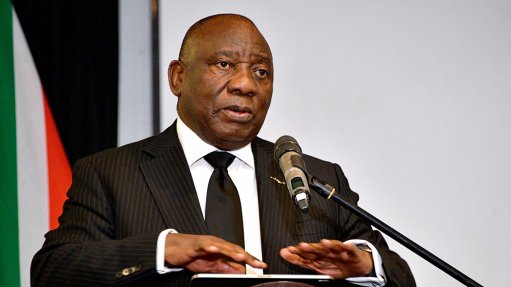
President Cyril Ramaphosa
President Cyril Ramaphosa has announced the establishment of the Presidential PhD Initiative, through the initial investment of R1-billion from the National Skills Fund.
The President was delivering the keynote address at the inaugural Presidential Plenary on Science, Technology and Innovation (STI), held on December 12 at the Council for Scientific and Industrial Research (CSIR), in Pretoria.
He emphasised that, for STI to serve people effectively, there needed to be “an aggressive and strategic” investment in education and skills development, with these being the lifeblood of a modern economy.
He noted that while there had been some progress, the pace of this needed to be bolstered, hence the Presidential PhD Initiative.
Ramaphosa explained that the aim of the first phase of the initiative would be to expose the “country’s brightest young minds” to cutting-edge thinking and research by negotiating opportunities at world-leading universities and research centres.
He said participants’ studies would be linked to large-scale and established research programmes, both in public research facilities and in industry.
Ramaphosa averred that the programme would build critical skills in areas including artificial intelligence research, advanced biotechnology, fuel cell development, batteries and other storage technologies, and next-generation mining.
He called on the private sector and South Africa’s international partners to assist in growing the investment, with the initiative aiming to have R5-billion in funding by 2030.
“Pooling resources and expertise has been a guiding principle of the work that government is doing with organisations such as Business Unity South Africa and Business for South Africa.
“As we reflect on the potential of STI to contribute to South Africa’s national priorities, we need to work collaboratively and ensure synergy between programmes across the National System of Innovation (NSI),” Ramaphosa emphasised.
He added that the country could also glean learnings from experiences of other countries, such as China and South Korea, which showcased evidence that investing in research and development engenders results.
Ramaphosa highlighted that South Africa had the second-largest investment in research and development on the continent, after Egypt, and averred that it had the potential to bolster this.
Ramaphosa also visited an exhibition of locally produced market-ready innovations in areas such as space science, health and energy.
Also speaking was Higher Education, Science and Innovation Minister Dr Blade Nzimande, who said there were two pillars underpinning the implementation of South Africa’s Science, Technology and Innovation Decadal Plan, which was approved by National Cabinet in 2022 to implement the country’s White Paper on STI 2019.
Nzimande explained that the first pillar entailed widening, deepening and transforming South Africa’s NSI, building on past investments and achievements, to raise the scale and intensify, and the impact, of the country’s innovation capabilities.
He highlighted that this was being done through enhancing human capabilities, expanding the research system to increase knowledge creation in targeted areas, ensuring an enabling environment for innovation and its flow into the economy, and increasing both public and private investment in STI.
Nzimande said that as part of the Innovation and Skills Compact, the department recently identified the critical skills needed to ensure effective implementation of the STI policies in line with the country’s Skills Masterplan.
He also mentioned considerable progress in integrating STI into planning for government as a whole, done in collaboration with the Department of Planning, Monitoring and Evaluation.
Nzimande highlighted the implementation of a Budget Coordination Mechanism for STI across government to streamline the allocation of resources to fund STI programmes at critical mass, for maximum impact.
He added that to streamline collaboration initiatives, Ramaphosa had set up an Inter-Ministerial Committee on Science and Innovation representing all Ministries that had innovation-related mandates.
The second pillar relates to systematic focus on specific STI technical areas that are closely linked to national priorities, including energy and water security; the digital and circular economies; modernisation of agriculture and manufacturing; and STI applications to improve the capability of the State and service delivery.